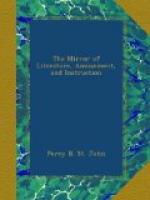predestined their perfect knowledge. Think you
that peace of mind, and health of body can be the lot
of him, whose life is perpetually in contradiction
to that of other men? His reason is perverted
who doubts the infinite power of God, and the man
inscribed on the list of Atheists must be necessarily
unhappy.”—“Atheist! Atheist!
This is then the end of your consolation to me!
It is thus that you call your son! Minister of
that God who reads the hearts of men, learn, my reverend
father, that it is beyond your power to discover an
Atheist, even if his own mouth made you the hypocritical
confession. An Atheist it is impossible to find—to
admit his existence is to outrage the Sovereign of
the World, who, in perfecting his noblest work, did
not forget to engrave there the name of its immortal
Author. Passions may arouse doubts; but when
the Atheist questions himself, the evidence of a God
confounds his incredulity, and the truth of the sentiment
which fills his thoughts absolves him of the crime
of Atheism. It is easy for you, my father, never
to murmur against the Author of your being; you, who,
in the gentle quiet of a life exempt from storms;
have acquired the conviction that the sun of your
old age will illumine the same scenes as did that of
your youth. As for me—thrown on the
earth like a disinherited child, born to feel happiness,
and never finding it—I wander from climate
to climate, with the sentiment of my everlasting misery.
Since reason has unfolded to me the feeling of my
wretchedness, nothing has yet tempered the bitterness
of my distress. Fed with the hate of men—betrayed
by those whose kindness I compared to that of angels—attacked
by an incurable disease, which has swept away my ancestors—tell
me, man of truth, if murmurs excited by despair can
characterize an Atheist, and bring upon him the anger
of Heaven. Oh! unhappy Byron!! if after so many
mortal trials thy last hope of salvation is taken
from thee—well!!”—Here
the voice of my lord faltered.
His gloomy silence lasted nearly a quarter of an hour.
All on a sudden he rose from his chair with eagerness,
and walked round the room, stopping before the holy
pictures which adorned it. A moment after he came
to me, and said, “Do you remember that you promised
a month ago to give me certain things which you possess?”—“I
possess very little, and that little has nothing which
can tempt you: however, speak!”—“I
remember the words of your answer, and you can no
longer refuse me anything.” Then he advanced
towards a corner of my room, and taking down a beautiful
crucifix which I had brought from Rome, he placed
it in my hands. I offered it to Byron, saying,
“This is the consoler of the unhappy.”
He seized it with transport, and kissing it several
times, he added, with eyes bathed in tears, “My
hands shall not long profane it, and my mother will
soon be the guardian of your precious relic!”
* * * *
*
To griefs congenial prone,
More wounds than nature gave he knew,
While misery’s form his fancy drew
In dark ideal hues, and horrors not its
own.




